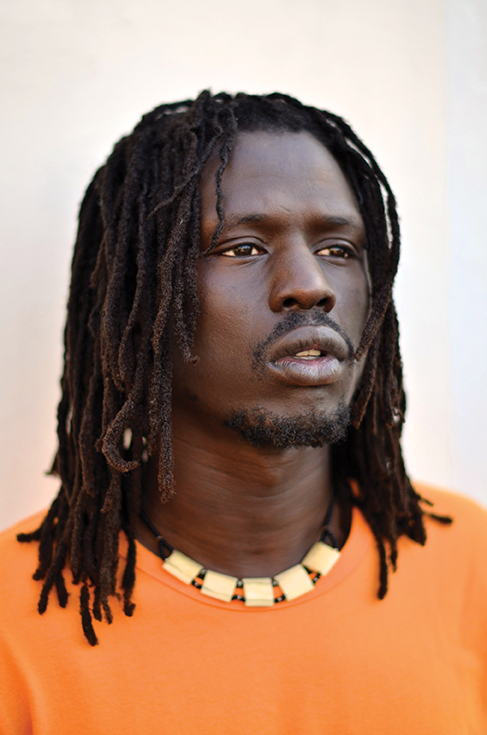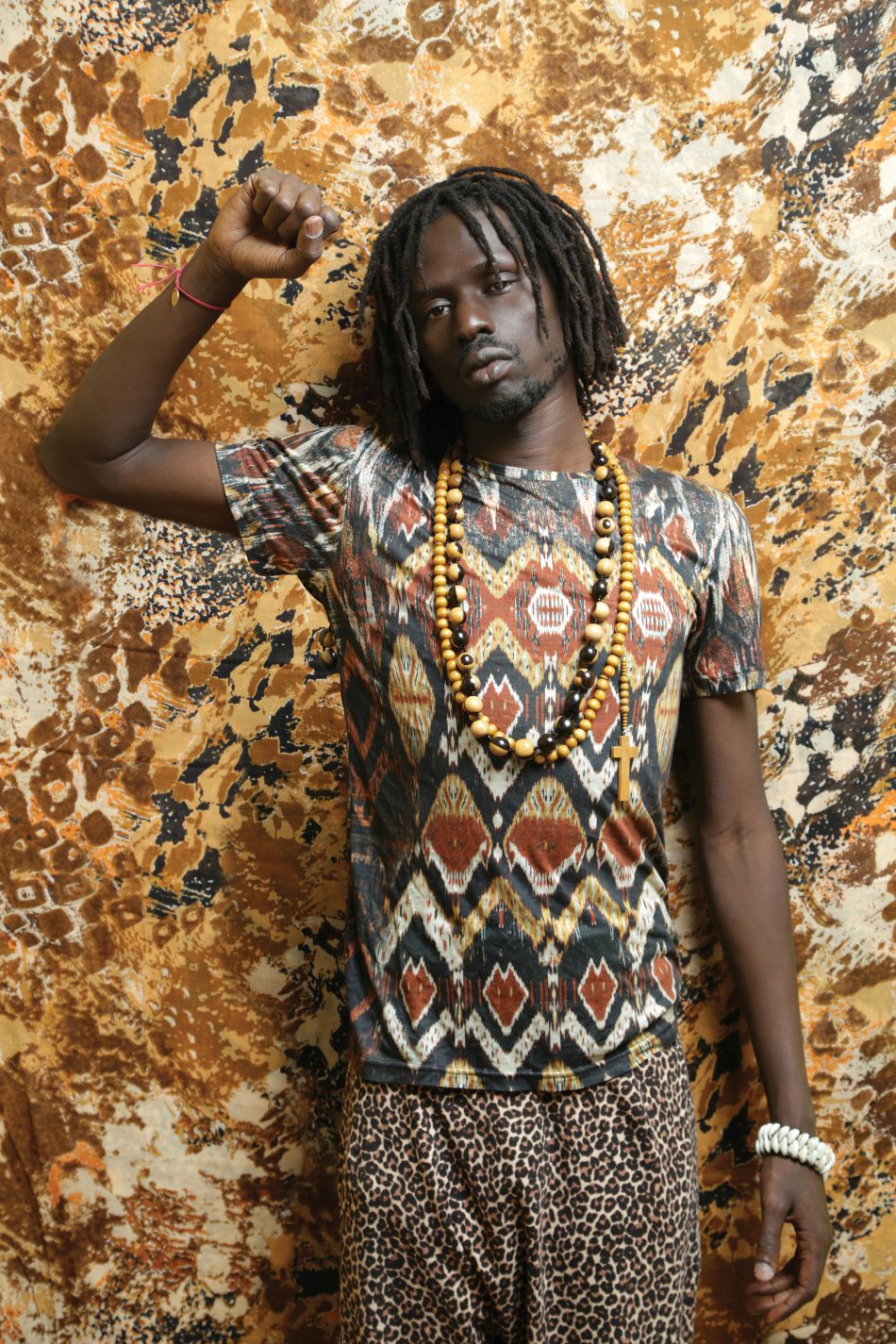From Child Soldier to Peacemaker

“The AK-47 is my father and my mother.” These were the lyrics that seven-year-old Emmanuel Jal sang when he was training to become a child soldier. For the majority of his childhood, war was the the backdrop for Emmanuel’s story, and the sounds of bullets and terrified civilians were part of its haunting soundtrack. “I learned that battle is like music,” Emmanuel writes in his autobiography War Child. “It ebbs and flows, screeching and silent in turns.” Now, the music that Emmanuel performs at age 37 embraces love and compassion after emerging from a world of hatred. The gun that Emmanuel was barely able to carry is replaced with a microphone as he travels the world sharing his story and engaging in a new battle for peace.
Emmanuel was able to rise from the ashes of his war torn country of Sudan and resurface as a world-famous recording artist, author, actor, entrepreneur, and political activist. Through his music, Emmanuel shares both the trauma he experienced from war and a call to action for peace. He has released five award nominated albums: Gua, Ceasefire, Warchild, See Me Mama, and The Key. Currently, Emmanuel and his sister Nyaruach are finalizing their first album together and anticipate the release of their upbeat single “Ti-Chuong” later this year. Many of his live appearances have philanthropic ties, and his nonprofit organization “We Want Peace,” has been organizing concerts since 2010 to spread awareness about various humanitarian issues. In the process, he has collaborated and performed alongside artists like Lauryn Hill, Peter Gabriel, Nelly Furtado, and Alicia Keys. Emmanuel also wrote his autobiography, War Child, which chronicles a detailed journey of his war experiences and his path to healing through music. When I spoke to Emmanuel, the first thing that stood out was that he was a beacon of positivity: he was engaged, curious, and laughed easily. It was astounding to me that a man whose childhood was marred by so much trauma could openly embrace the world with his arms outstretched.
“Music, what it does, is it activates positive emotions in your body that manage your mental state and physical state,” Emmanuel says. “Music itself is love, it’s a form of energy: a vibration.”
Along with his musical pursuits, Emmanuel was the subject of a multi-award winning documentary about his life, also entitled War Child, and he co-starred with Reese Witherspoon in The Good Lie(2014) in which he played a Sudanese refugee. However, these were not the first times that Emmanuel was on camera. Miraculously, he was captured on film as a child in a 1989 documentary about the Sudanese refugee crisis, which unknowingly reflected a much more sinister time in Emmanuel’s life.
On film, Emmanuel was a precocious child with a mischievous smile who loved to entertain. He was often the spokesperson for his peers and was known for being able to charm the UN Camp volunteers into giving the refugees more food. But beneath his bright smile, a seed of hatred was being sown after years of conflict with the Northern Sudanese Arab Muslims. Before Emmanuel became a child soldier, he and his family were refugees caught in the crossfire of the Second Sudanese Civil War. In a fight for control over territory and the oil supply, Emmanuel witnessed close family members being beaten and raped, and their villages burned to the ground. A huge comfort to Emmanuel during these times was to hear his mother sing hymns. He described how the way “her face would light up as the music filled her” fostered his own love for music. However, the love he felt for his mother quickly turned to grief, when he was separated from her during a raid and later found out that she had died in the attack.
When Emmanuel was stranded in an Ethiopian refugee camp plagued by disease and starvation, he was recruited by the Sudan People’s Liberation Army (SPLA) to fight for the liberation of the South Sudanese. With the pain of his mother’s death still etched into his heart, he voluntarily joined the SPLA to avenge her, viewing Arabs and Muslims as the common enemy. He spoke about how he later had to come to a place of forgiveness in order to overcome his hatred: “When you don’t forgive, you allow yourself to be a slave to the person who has hurt you, because they live inside you everyday. So that’s what I did basically. And since then, forgiving became one of the principles that I live by – that I have to forgive. Not holding grudges, no matter how big it is.”
Emmanuel’s first album, Gua, is a powerful play on words. Gua translates to “Peace” in his native Nuer language, as well as “Power” in Sudanese Arabic. Featuring a mix of Arabic, English, Swahili, Dinka and Nuer, the album is a symbolic unification of cultures and a significant marker for Emmanuel in forgiving a former enemy. The music resonated across cultural boundaries. “People noticed,” Emmanuel says. “Saying ‘Yo, you should keep doing this. It will take you far away.’ I thought they were joking, then here I am. I didn’t plan to be a musician, I was just doing it for fun.”
As a teen, Emmanuel was highly influenced by American artists like Ice Cube, Tupac, LL Cool J, Mary J. Blige, Puff Daddy, and Chaka Khan. Taking inspiration from them, Emmanuel wrote his own version of hip hop, incorporating traditional African beats and a mix of native languages. As his music began to take off, Emmanuel’s record label pushed him to be more ambitious with his album Ceasefire. He was paired with artist Abdel Gadir Salim – a Northern Sudanese Muslim. “It was a big challenge for me,” Emmanuel says. “The label was like, ‘Can you do a record with a Muslim?’- which was a breakthrough. It was amazing, phenomenal! It opened many doors and it opened my career.” Collaborating with a Muslim Arab was the final stage for Emmanuel to overcome his hatred, and the efforts paid off when the album became his first international release.

When Emmanuel performs, he loses himself on the stage in playful disarray: hair flying, smiling from ear to ear, and dancing without inhibition. “[The] stage is the only place I can become a child again. It’s a place I was able to see heaven. Once I’m on stage, and I have the mic, and the music is engaged, I’m in heaven.” Emmanuel has described in the past how music has the potential to make a man feel like a giant. However, in this case, it empowers him to feel small again, helping him to reclaim a lost childhood.
Emmanuel may have found his heaven on the stage, but he wouldn’t have found it without the help of an angel. Emmanuel cites Emma McCune, a British aid/UNICEF worker, as his savior who rescued him along with more than 150 Sudanese refugee children. Only months after she smuggled Emmanuel to Nairobi, Kenya so he could receive an education, Emma was killed in a car accident, robbing Emmanuel of yet another maternal figure in his life. Emmanuel dedicates his song “Emma” to her in his album Warchild, rapping the lyric “I ain’t an angel, hope I’ll be one soon. And if I am, I wanna be like Emma McCune.” Aspirations became actions as Emmanuel followed in his adoptive mother’s footsteps and became a savior of others, too. “Gua Africa” is the charity that Emmanuel founded for refugees, including former child soldiers, to get sponsorship to receive an education. Donations go toward sponsoring individuals and supporting existing schools in South Sudan and Kenya. “We’ve got people who went to universities, got their masters [degrees] in the UK. Some of them have drive, just working all the way from the refugee camp and made it all the way out.” Emmanuel’s ultimate goal is to build a school, which has proven to be difficult over the years in the face of ongoing conflict in both regions. “Right now, we’re looking to find more people to support it. Any resources at the moment can really do a good job, because these countries are at ground zero, now.”
Emmanuel also has a business that supports Gua Africa called “Jal Gua,” which translates to “Walk with Peace,” or in Arabic Sudanese, “Walk with Power.” Jal Gua is a super food powder made from a blend of two extremely nutritious African ingredients, Sorghum and Moringa. Emmanuel was inspired to create the powder after the ingredients helped to significantly lower his blood pressure. For every package, 5% of the profits go toward funding Gua Africa.
Along with supporting his cause through his entrepreneurial pursuits, he’s spreading his message through speaking engagements. Emmanuel Jal has addressed both the UN and U.S. Congress, using his story to advocate for reconciliation and peace. “Battles are fought in the mind, and won in the heart,” Emmanuel says. “What was on my mind was trauma, poverty, and many other things. And how I came out of that is what I want to show people.” From child soldier to peacemaker, Emmanuel Jal overcame hatred by healing through his creativity and music. If music is love, then his story travels on that vibration, radiating across all racial divides and uniting people through their humanity. Just as he rapped in his song Warchild, Emmanuel puts his destiny into words: “I believe I’ve survived for a reason. To tell my story, to touch lives.”
To support refugees, visit www.gua-africa.org
Text Zee Chang
Photography by Tania Campbell-Golding

